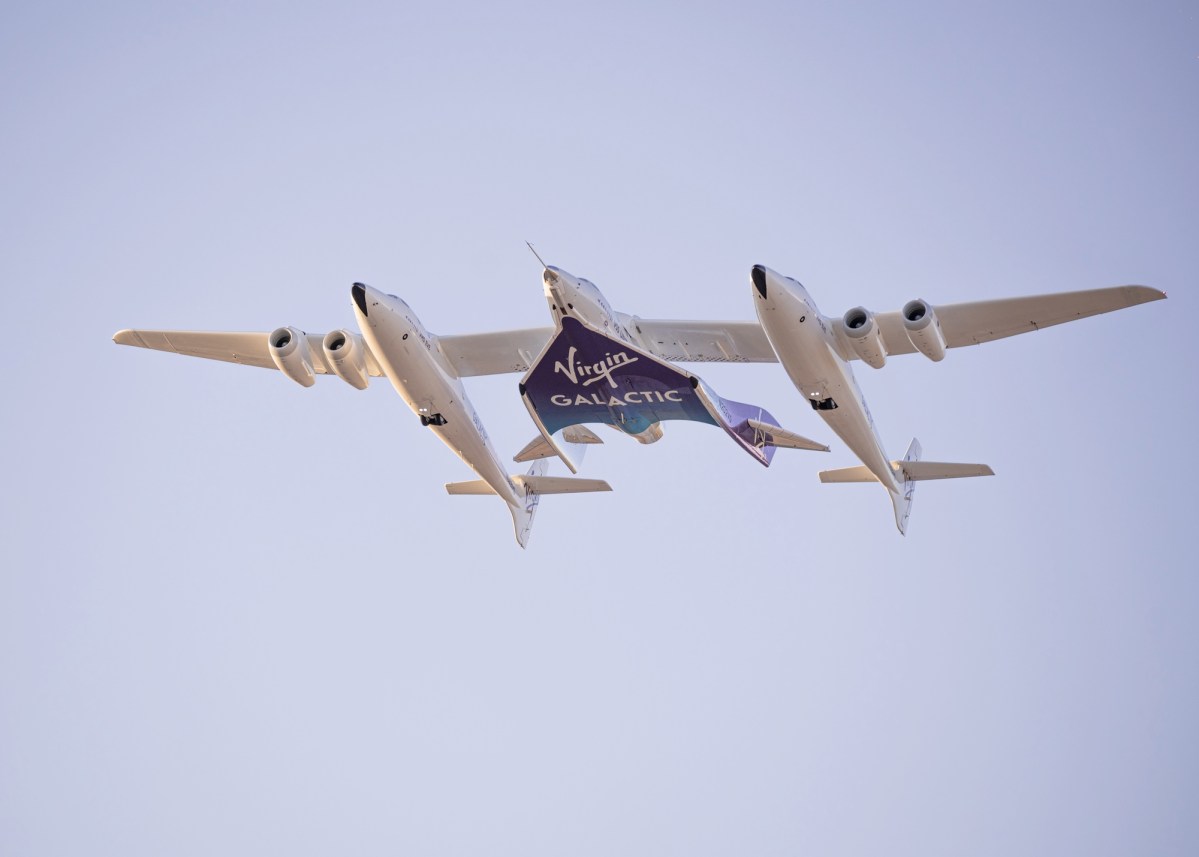WASHINGTON — Virgin Galactic says it will fly its existing “mothership” aircraft more frequently than previously planned with its upcoming Delta-class suborbital spaceplanes, allowing the company to defer development of a new plane while also dealing with a legal dispute with Boeing.
In a May 7 earnings call, Virgin Galactic executives said they expect to fly their VMS Eve aircraft up to 125 times a year once the company starts commercial service of the Delta spaceplanes, the successor to the existing VSS Unity, in 2026. That flight rate assumes two Delta spaceplanes in service.
That flight rate of three per week is 50% higher than earlier projections. That would allow the company to fly 750 customers a year and produce annual revenue of $450 million, assuming an average ticket price of $600,000, the current list price set by Virgin.
That flight rate would put the company on a path to profitability. “The third flight per week will prove highly beneficial to our business model when we resume commercial service,” said Michael Colglazier, Virgin Galactic’s chief executive, on the call. “With the launch of just our first two Delta ships, we expect to operate a robust and meaningful business with positive operating cash flow.”
“The planned increase in flight cadence for our mothership Eve is a gamechanger when our first two Delta ships enter commercial service,” added Doug Ahrens, chief financial officer of Virgin Galactic. “This is the first steppingstone in our economic growth story as these profits can be reinvested further expand our fleet and drive additional growth.”
Virgin concluded that Eve could make three flights a week after the company developed what Colglazier called a “targeted maintenance plan and operations schedule” based on the plane’s performance in recent flights carrying VSS Unity. The plane, known as WhiteKnightTwo when developed by Scaled Composites, started flights in 2008 and went through what he called a “major enhancement program” before the series of Unity commercial flights that started last year.
Relying on Eve is part of Virgin Galactic’s approach to conserve its existing cash and focus on development of the Delta-class spaceplanes while delaying work on a next-generation mothership to replace Eve. “We resequenced the next mothership program to better manage our capital,” he said, with that new plane now expected to enter service no earlier than 2028.
Virgin Galactic had selected Aurora Flight Sciences, a subsidiary of Boeing, to develop that new mothership in 2022, with plans then to have the first plane to enter service in 2025. However, work on the plane stopped a year later.
Boeing sued Virgin Galactic in March, alleging that Virgin had not paid $26.4 million in invoices for earlier work and also misappropriated intellectual property. Virgin denied the claims and countersued Boeing in April, arguing that Boeing performed “shoddy and incomplete” work on the mothership contract.
Those dueling suits came up near the end of the earnings call when an analyst asked about them. “The issues with Boeing are not material and are not going to be impacting how we progress our mothership program,” Colglazier said. “It will not be a distraction for us.”
Analysts also questioned the economic model put forward by Virgin, noting that many of the company’s backlog of more than 700 customers signed on years ago at much lower ticket prices. Ahrens said a little more than 600 of its customers are at lower price points, and that the $450 million annual revenue figure would be the company’s run rate “at about 12 months out” once it has flown most of its backlog.
He added that the company does have ways to sell tickets at a premium, noting that the upcoming Galactic 07 flight by VSS Unity will fly four people at an average seat price of more than $800,000.
That Galactic 07 flight, scheduled for no earlier than June 8, will be the final flight of Unity, as the company focuses its resources on developing the Delta-class vehicles. That flight will carry a private astronaut affiliated with Axiom Space and three private astronauts, two from the United States and one from Italy.
Unity “has served Virgin Galactic incredibly well,” Colglazier said, including informing the design of the Delta-class vehicles. He said Unity will remain at Spaceport America after its final flight and be used by the company for training.
